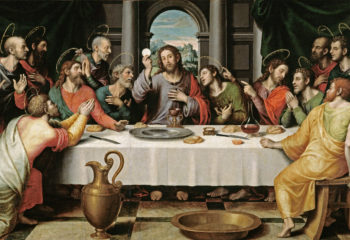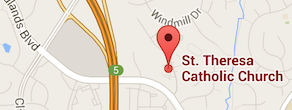Faith and Religion – As an Act and as a Virtue
From a Parishioner:
How do you explain the importance of choosing a religion to support your faith and staying convicted that religion is important? I was recently challenged by the notion that faith succeeds religion, and so, in a roundabout way, if I say that being Catholic is correct, I am by default being a judgmental hypocrite. Essentially, as long as Christ is the focus, then does it really matter which religion you choose?
This is a huge question! There are philosophical and theological thought processes going on here. But, we remember, God is simple.
Let’s define our terms first, so we have a common understanding in our discussion with others.
FAITH: Both a gift of God and a human act by which the believer gives personal adherence to God who invites his response, and freely assents to the whole truth that God has revealed. It is this revelation of God which the Church proposes for our belief, and which we profess in the Creed, celebrate in the sacraments, live by right conduct that fulfills the twofold commandment of charity (as specified in the ten commandments), and respond to in our prayer of faith. Faith is both a theological virtue given by God as grace, and an obligation which flows from the first commandment of God (26, 142, 150, 1814, 2087). Catholic Church. (2000). Catechism of the Catholic Church (2nd Ed., pp. 878–879). Washington, DC: United States Catholic Conference.
RELIGION: A set of beliefs and practices followed by those committed to the service and worship of God. The first commandment requires us to believe in God, to worship and serve him, as the first duty of the virtue of religion (2084, 2135). Catholic Church. (2000). Catechism of the Catholic Church (2nd Ed., p. 896). Washington, DC: United States Catholic Conference.
So, we have this cycle exitus-reditus – that is, God acts first, then humanity responds. God gives us life, then we respond by the very nature of our creation to look back to our creator. Just as the art reflects the artist, we choose to image God. So, Faith precedes Religion – God gives us the gift of Faith, and we respond in Faith as a human act towards the supernatural.
So, when you say, “being Catholic is correct”, why are you able to make that assertion?
- There are 3 aspects to the virtue of Faith:
- Credo Deum (esse)—belief that is directed to the object of faith. “I believe in the existence of God.”
- Credo Deo—I believe the person of God—the Person whom I trust. I believe in His words.
- In faith, there are 2 moments—1) the belief in the first truth, and 2) the belief in the credibility of the witness.
- Credo in Deum—“in” followed by the accusative case, which implies movement toward God. I’m moving toward God, Father Son and Holy Spirit.
For many people faith is only limited to the first or even the second aspect of faith, but it just becomes a plug to fill a hole in their life. But belief is not true belief until it becomes the driving force of our lives: picking up all of our powers, creativity, and projects, and moving towards God. We are on pilgrimage. This type of faith leads to sanctification.
The witness that is the motive of faith is given in Credo Deo, which leads us to Credo in Deum.
We believe in God because the Divine person has touched us in some way. The object is the motive for faith…God is in who we believe…God is the motive for believing. While it is possible to have other motives such as, authority of parents, priests, or cultures, placing an undue importance on secondary motives, diminishes our faith.
We may discover that we believe because we live in a believing environment – a support that is valuable, but not the ultimate basis of one’s faith. That faith must be based entirely on God Himself, otherwise one’s faith is superficial.
In summary, God is the object and motive of faith, but also the end.
Credo in Deum is a movement of Love. Without Love (charity) faith has lost its crown. We need love (the grace of God) to move us toward our end. There must be a central orientation toward God in our lives.
So, are you being a hypocrite? No, you are Catholic because you believe that Jesus was God and you believe in the words He spoke and you believe in the Tradition He gave to the Apostles – this Deposit of Faith became the Catholic Church. Nor are you being judgmental. A mere statement of fact and faith does not imply judgment on another. Jesus told us to love all of our neighbors, even our enemies. The Church judges the morality of human acts based on what Christ told us, but the judgment of the human person is reserved to God.
Yes, it matters what religion you choose, because as an act of faith, you are choosing the set of beliefs and practices that Jesus, God, transmitted to you by His words and actions. Jesus told us to celebrate this way, so we celebrate this way. Jesus placed the binding and loosing of sins upon Peter, the rock, the Church (MT 16:13-20), so we follow Peter and His successors. God gave the Holy Spirit to the Church (John 20:19-23), built upon Peter, so that Holy Mother Church would never fall into error, despite whatever imperfections existed in her members, both the laity and the clergy. God gave us His Body and Blood, Soul and Divinity, so that we may have food for the journey (John 6; John 14-16). The source of summit of Christian life is found in the Eucharist – the free choice of the will to assent to the Catholic Faith very much matters.
This is a crucial distinction, the real presence of Christ, confected by the priest at the Mass:
I am the living bread which came down from heaven; if any one eats of this bread, he will live forever; and the bread which I shall give for the life of the world is my flesh.” 52 The Jews then disputed among themselves, saying, “How can this man give us his flesh to eat?” 53 So Jesus said to them, “Truly, truly, I say to you, unless you eat the flesh of the Son of man and drink his blood, you have no life in you; 54 he who eats my flesh and drinks my blood has eternal life, and I will raise him up at the last day. 55 For my flesh is food indeed, and my blood is drink indeed. 56 He who eats my flesh and drinks my blood abides in me, and I in him. 57 As the living Father sent me, and I live because of the Father, so he who eats me will live because of me. – John 6:51-57
“Truly, truly, I say to you, unless you eat the flesh of the Son of man and drink his blood, you have no life in you; he who eats my flesh and drinks my blood has eternal life, and I will raise him up at the last day” – We believe Jesus, and we believe IN Jesus, thus, the fullness of these words can only be manifested at the Mass, celebrated by the Catholic Church.

